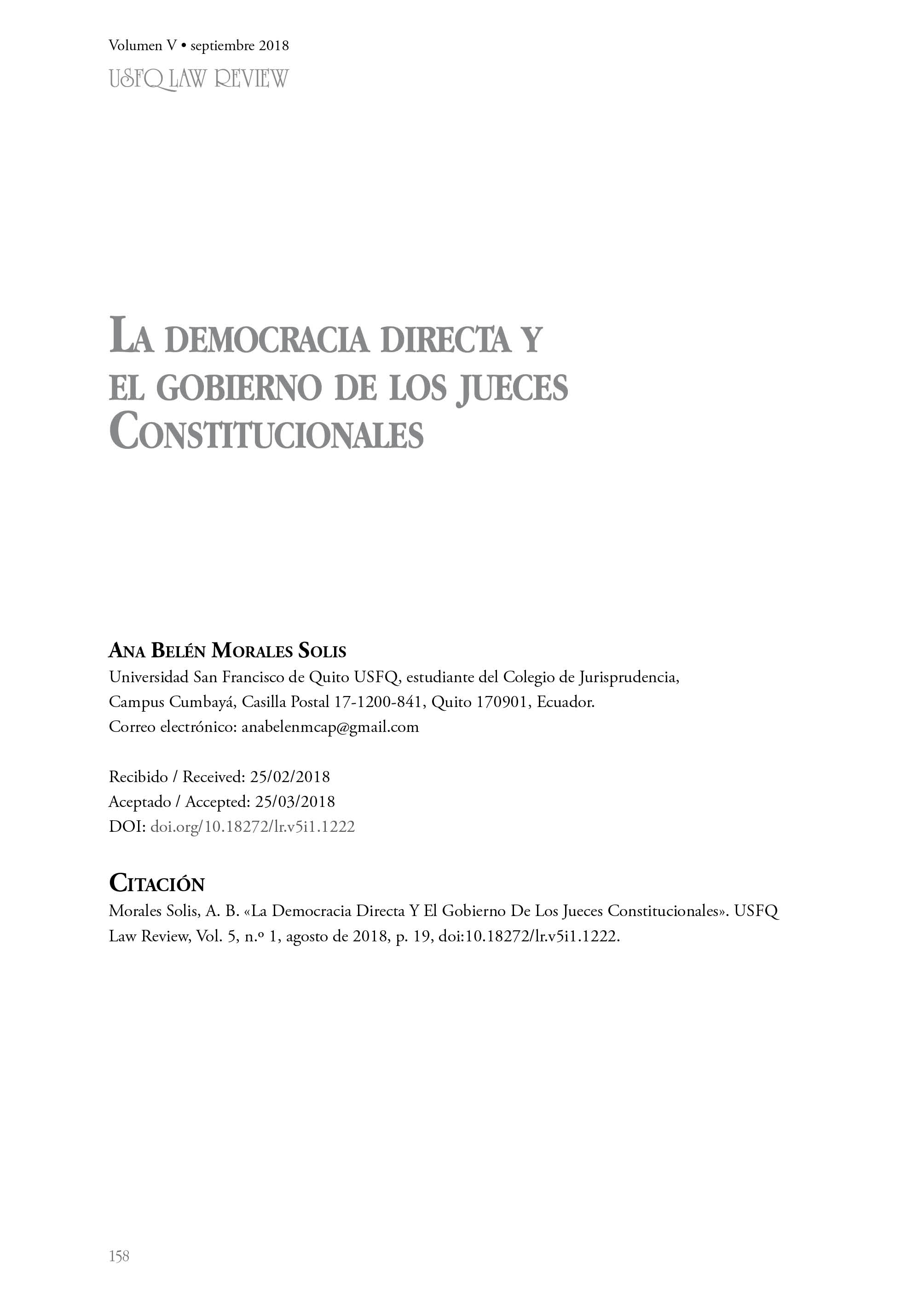Direct Democracy and the Government of Constitutional Judges
DOI:
https://doi.org/10.18272/lr.v5i1.1222Keywords:
direct democracy, referendum, citizen participation, Constitutional Court, Constitution of Ecuador, Organic Law of Jurisdictional Guarantees and Constitutional Control, government of judgesAbstract
The Ecuadorian legal system has undergone several modifications in relation to popular consultation by citizen initiative. First, on December 21, 2015 one of the constitutional amendments has limited the scope of popular consultation. Second, the precedents of the Constitutional Court of Ecuador have established general rules regarding the popular consultation procedure by citizen initiative. Third, the Constitutional Court has issued a regulation that alters the accounting of terms of the popular consultation procedure.
When the laws are clear and precise, the function of the judge is only to prove a fact . However, all the modifications have been made directly and indirectly by the Constitutional Court of Ecuador. So, the legislator has not issued clear and precise norms? Independent of that, the Constitutional Court, searching to clarify and specify normative precepts, has occasioned restrictions on the rights to citizen participation, obstacles to the exercise of direct democracy and uncertainty in the popular consultation instead.
In this way, three fundamental points will be analyzed. First, the scope of the popular consultation has been limited by virtue of a constitutional amendment restricting the right of citizen participation. Secondly, through compulsory jurisprudence, the Constitutional Court of Ecuador has established that constitutional control is carried out after the collection of signatures, leading to citizens taking the risk of devoting economic and physical efforts to collect signatures with uncertainty that the questions are constitutional. This has led to hindering and ineffectiveness of the popular consultation procedure. Finally, the Constitutional Court, through its regulations, has changed the counting of deadlines and terms by shielding itself from the deadlines established in the constitution. Thus, all the actions of the Constitutional Court of Ecuador have led to a clear government of the judges.
Downloads
References
Aguirre, Pamela. "Colectivo Rafael Contigo Siempre ultima firmas para que presidente sea candidato". El Universo, 8 de agosto de 2016.
Beccaria Cesare. De los delitos y de las penas. Bogotá: Editorial Temis, 2013.
Código Orgánico General de Procesos. Artículo 141. Registro Oficial Suplemento No. 506 de 22 de mayo de 2015.
Constitución de la República del Ecuador. Artículo 1. Registro Oficial No. 449 de 20 de octubre de 2008.
Corte Constitucional del Ecuador. Caso 0001-14-RC.
Corte Constitucional del Ecuador. Caso 0002-10-CP. Dictamen, 25 de septiembre de 2013.
Duverger, Maurice. Institutions politiques et droit constitutionnel. París: Presses Universitaires de France, 1955.
Enmiendas a la Constitución a la República del Ecuador. Artículo 1. Registro Oficial Suplemento 653 de 21 de diciembre de 2015.
Gagliardo, Antonio. Citado en Maldonado, Carla. "La consulta popular está apegada a la Constitución y a la ley". El Telégrafo. 3 de diciembre de 2017.
Garrido, Juan Antonio. El Gobierno de los jueces. http://www.ilustrados.com/tema/8468/gobierno-jueces.html (acceso: 18/02/2018).
Guariglia, Osvaldo. Democracia: Origen, Concepto y evolución según Aristóteles. Argentina: Conicet.
Kafka, Franz. El proceso. Quito: Libresa, 2011.
Lawrence, Farley. Plebiscite and Sovereignty. Boulder: Westview Press, 1986.
Ley Orgánica de Garantías Jurisdiccionales y Control Constitucional. Artículo 170. Registro Oficial Suplemento 52 de 22 de octubre de 2009.
Ley Orgánica de Participación Ciudadana. Artículo 5. Registro Oficial Suplemento No. 175 de 2 de febrero de 2010.
Maldonado, Carla. "La consulta popular está apegada a la Constitución y a la ley". El Telégrafo. 3 de diciembre de 2017.
Ossorio, Manuel. Diccionario de Ciencias Jurídicas, Políticas y Sociales, primera edición. Guatemala: Datascan.
Pacari, Nina. Citado en Maldonado, Carla. "La consulta popular está apegada a la Constitución y a la ley". El Telégrafo. 3 de diciembre de 2017.
Pozo Bahamonde, Juan Pablo. "Democracia comunitaria: descolonizar el saber, reinventar el poder". Gaceta de Análisis Político Electoral N° 7, (2014).
Pozo, Fabián. Enmiendas que Sustituyen la Constitución, Estatizando los Derechos Ciudadanos, 4 de septiembre de 2014. http://fabianpozo.blogspot.com/2014/09/enmiendas-que-sustituyen-la.html (acceso: 16/02/2018).
Prud´homme, Jean François. "Consulta Popular y Democracia Directa". Cuadernos de Divulgación de la Cultura Democrátiva, 15 (2003).
Raza, Stalin. Citado en Maldonado, Carla. "La consulta popular está apegada a la Constitución y a la ley". El Telégrafo. 3 de diciembre de 2017.
Reglamento de Sustanciación de Procesos de Competencia de la Corte Constitucional. Artículo 85. Registro Suplemento No. 613 del 22 de octubre de 2015.
Reglamento para el Ejercicio de la Democracia Directa a través de la Iniciativa Popular Normativa, Consultas Populares, Referéndum y Revocatoria del Mandato. Artículo. 19. Registro Oficial Suplemento No. 513 de 2 de junio de 2015.
Rivas, Alexis. "Retos y perspectivas de la democracia comunitaria". Serie Gaceta Opinión Electoral N°7, (2014).
Rodríguez, Blanca y Francés, P. Filosofía Política II. Tema I. Apuntes de clase, 2010.
Sartori, Giovanni. Teoría de la democracia, volumen II. Madrid: Alianza Editorial, 1988.
Sin Autor. "Empezó la recolección de firmas para consulta popular por el Yasuní". La Hora, 16 de octubre de 2013.
Sin autor. "Una reforma simple a Constitución requiere voto de 91 legisladores". El Telégrafo. 20 de febrero de 2013, pár. 12.
Sin Autor. La restricción y suspensión de derechos (artículo 29). Los Derechos Humanos que no se suspenden son los inherentes a la persona y por ello Derechos Fundamentales también llamados Humanos, 2 de septiembre de 2014. https://fanaticodelderechoysulogica.wordpress.com/2014/09/02/restriccion-y-suspension-de-derechos-articulo-29-los-derechos-humanos-que-no-se-suspenden-son-los-inherentes-a-la-persona-y-por-ello-derechos-fundamentales-tambien-llamados-humanos/ (acceso: 22/02/2018).
Sin autor. Las "Enmiendas" a la Constitución Propuestas por el Correísmo, 2015. https://lalineadefuego.info/2015/02/02/las-enmiendas-a-la-constitucion-propuestas-por-el-correismo-por-montecristi-vive/ (acceso: 14/02/2018).
Troper, Michel. "Existe-t-il un concept de gouvernement de juges?". Gouvernement des juges er démocratie. (2001).

Published
How to Cite
Issue
Section
License
In relation to copy rights, authors publishing with USFQ Law Review know and accept its internal policies, including but not limited to:
1. Open Access Policy.
2. Authorship Policy.
3. Copyright Policy.
4. Pre-Publication Policy.
5. Post-Publication Policy.
6. Intellectual Property Protection Policy.
7. Digital Preservation Policy.

